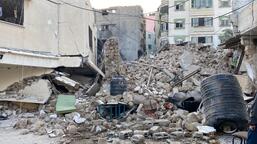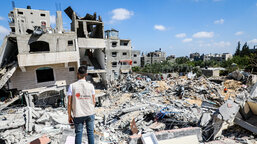The ongoing war between Israel and Hamas is drastically affecting the civilian population, especially in the Gaza Strip. It is facing an unprecedented humanitarian disaster. We spoke to Kateřina Velíšková, Regional Manager for the Middle East, about the long-term situation in Gaza, what is happening on the ground now and how Caritas is helping. Kateřina herself spent a year in Israel.
What is the long-term situation in the West Bank and Gaza?
The situation in these areas has been very difficult for a long time. There are significant restrictions on freedom of movement for their residents, which not only limits opportunities to travel for work or study but also reduces access to basic needs such as healthcare. Living conditions in the Gaza Strip are even more complicated as a result of the years-long blockade. The economic situation is also tricky and unsustainable for many people, especially in Gaza, in the long term. Moreover, there is little prospect of improvement. Instead, there has been a gradual deterioration in recent years. This is also linked to recurrent periods of violence, which not only lead to a deterioration in the security situation but also have a significant negative economic impact.
You yourself lived in Jerusalem for a year and studied Israeli and Middle Eastern politics at the Hebrew University there. How do you remember your stay?
I lived in Jerusalem for a year; it was at the turn of 2017 and 2018. In addition to studying, I also travelled extensively in the region and visited the West Bank. The difference between the West Bank and Israel is evident at first glance. Just the difference in the ability to move freely is felt almost immediately. In the West Bank, one passes through an extensive series of checkpoints and goes through security checks by the Israeli army. But the difference is also visible regarding the economic situation; the West Bank is much poorer.
At the same time, the whole area is very fragmented, with three different zones established after the Oslo Accords, but they are scattered, and their administration is not uniform. In some places, it falls under Israel, in others, it falls under the Palestinians, or the government is shared. As a result, many people from the West Bank try to find work in Israel. But livelihood opportunities are also linked to the security situation. When this deteriorates, many people lose their livelihoods. This also applies to those who depend on tourism, for example in Bethlehem.
The situation is most complicated in the Gaza Strip, an area with one of the highest unemployment rates in the world, where almost half the population is made up of children. How is life in the area in the long term?
Gaza is facing huge unemployment, which exceeds 45% and is as high as 70% among young graduates. It is also largely dependent on humanitarian aid for a long time. Four-fifths of the population live in poverty, according to the UN. In the Gaza Strip, a number of organisations, including the UN, have been helping for a long time, supporting the provision of humanitarian aid, education, medical and social care, but also helping to provide livelihoods and shelter. Caritas Jerusalem is also helping in Gaza, with a team of hundreds of staff permanently on the ground.
Its primary focus is providing medical and psychosocial care and other humanitarian needs. Caritas operates its clinic on the ground and also has over fifteen mobile health clinics, helping to provide much-needed health care for the people of Gaza. In the past, Caritas Czech Republic has also been involved in providing humanitarian aid in the Gaza Strip in cooperation with Caritas Jerusalem. This included mainly medical supplies, food and hygiene packages, and psychosocial support. In the West Bank, Caritas Jerusalem's main focus is on livelihood support.
What is the situation in Gaza now and what do the people need most?
The current situation is very difficult. The most acute phase of fighting is ongoing, affecting the ability to provide the necessary humanitarian aid on the ground. For example, the clinic run by Caritas Jerusalem has had to suspend its activities because, among other things, it lacks the fuel needed to run its generators. Caritas workers provide limited medical care in two local churches, treating and caring for the injured. At the same time, psychosocial support is still being provided remotely to the local population, who are struggling with a lack of basic needs and are under constant shelling.
They also prepare to provide immediate humanitarian assistance, such as distributing food and hygiene packages, medicines and medical supplies. But acute humanitarian assistance is just the beginning. The devastation in Gaza is immense and will take years to rebuild. Moreover, it is a job for many organisations and will require many times the amount of aid currently flowing into the Gaza Strip.
Thank you for the interview.











